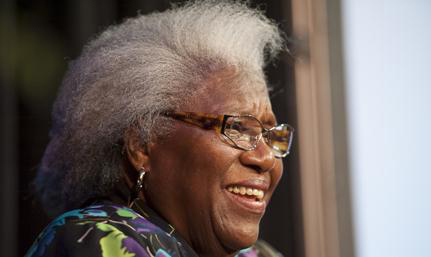|
 |
Leah Tutu
18 October 2013 |
There are treasures in life, but owners are few
Of money and power to buy things brand new
Yet you can be wealthy and feel regal too,
If you will just look for the treasures in you …
The joy and the laughter, the smile that you bring;
The heart unafraid to love and to sing;
The hand always willing to help those in need;
Ones quick to reach out, to labour and feed.
So thank you for sharing these great gifts inside;
The caring, the cheering, the hug when one cried.
Thanks for the energy, encouragement too,
And thank you for sharing the treasures in you. (Author unknown)
With these words, Thandeka Tutu-Gxashe embodied the celebration in honour of her mother, Leah Tutu.
On Thursday 17 October 2013, the Annual Intercontinental Leah Tutu Symposium was launched at the UFS’ Bloemfontein Campus. Dignitaries and students alike flocked to the Centenary Hall where friends and family shared their immense love and respect for Ms Tutu.
Approaching the podium, Eunice Dhadhla (co-founder with Ms Tutu of the Domestic Workers Union) started humming and in an instant the audience had risen to their feet and the words “My mother was a kitchen girl. My father was a garden boy. That’s why I’m a unionist”, reverberated through the hall.
“I am what I am today because of her,” Dhadhla said of Ms Tutu. They have walked a long hard road together to ultimately unite domestic workers across the globe. Stretching her small body to its full length, Dhadhla imparted one of the most valuable lessons she has learned from Ms Tutu, “Stop crawling, stand up and walk for yourself.”
As soon as Dr Sindiwe Magona – acclaimed writer and poet – ascended the stage, her energy rushed across the room with electrifying intensity. Her high regard for Ms Tutu as public icon as well as a mother, wife and friend, was palpable. Belting out line after line of a poem she wrote especially for Ms Tutu, the audience echoed their agreement in a mutual exchange.
No sooner were they seated, than Archbishop Desmond Tutu and Prof Jonathan Jansen had the crowd roaring with laughter. Archbishop Tutu’s familiar chuckle peppered his story of how he came to propose to his wife. It was clear, though, how much he reveres Ms Tutu’s presence in his life. With enormous awe, he revealed her innate power, specifically during difficult times in our country’s past – from weathering death threats against her husband to public humiliation.
But despite adversity and heartache, in front of the Centenary Hall, this matriarch stood up and beamed joy into everyone present.